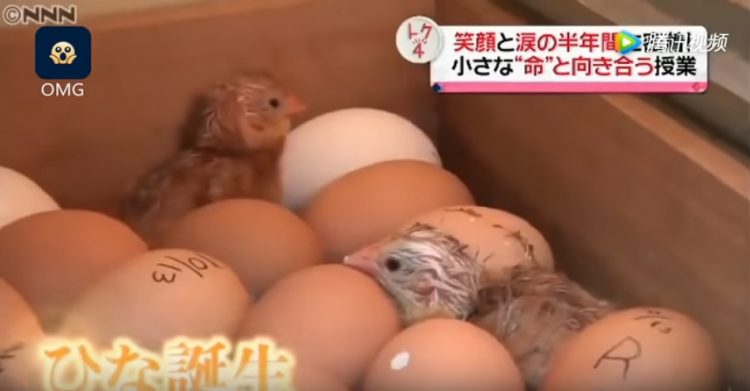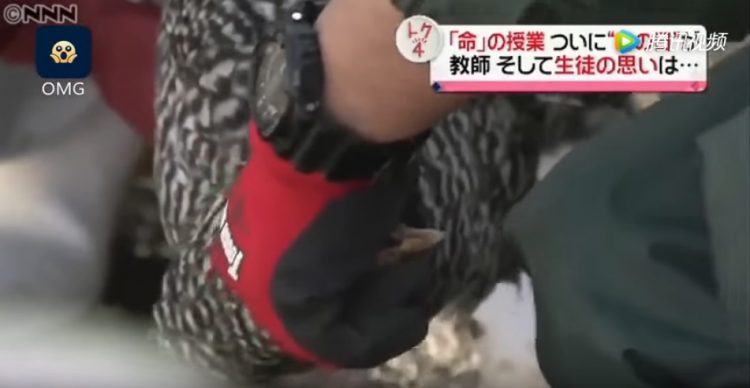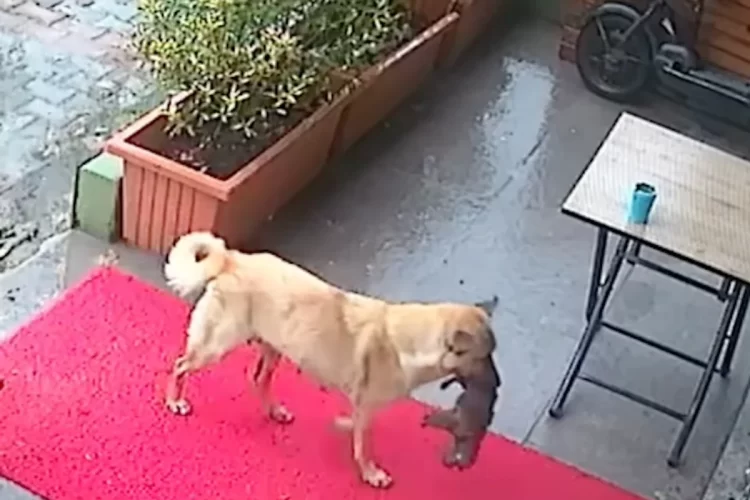For the past 60 years, every generation of freshman students at Izumo Agricultural and Forestry High School, in Izumo, Japan’s Shimane prefecture, has taken the “Class of Life”, a controversial six-month course during which the students help hatch and raise chickens, before having to slaughter and eat them.
Last year, the Class of Life at Izumo High School started in October, when they were presented with around 60 chicken eggs. Under the guidance of a teacher, they prepared them for incubation, washing them, arranging them in a special tray and learning to adjust the humidity and temperature on the incubator. For the next three weeks, they were in charge of monitoring the eggs and making sure that the right conditions for hatching were met. Once the chicks hatched, each student had to pick one and raise it as their own, knowing full well that in just a few months they would have to kill and eat it.

Photo: video screengrab
The students were responsible for the well-being and proper growth of the chickens. They had to feed them, change their water frequently, monitor the temperature of their enclosure, as well as weight them periodically and record their progress. As you can imagine, some students get attached to the chickens, with some going as far to treat them like pets, despite knowing the gruesome conclusion of the class. Other try their best not to get to close to the birds, for that exact same reason. For example, Arakawa Yumesui, one of the students taking the Class of Life last year, told Nippon TV that she did not dare name her chicken for fear of attachment. Even so, when the time came to take its life, she said she felt uneasy because it was kind of like a pet to her.
Last month, after a final measurement and weighing of the chickens, the students were taught how to kill a chicken by their teacher, before having to slaughter the ones they had spent six months raising. In a Nippon TV video, some of the girls taking the Class of Life can be seen turning away as the teacher and other students slaughter the chicken, while others shed tears as they force themselves to look on, and told the chickens “I’m sorry” before taking their lives. It’s a painful experience, but one that is supposed to teach the students a valuable lesson.

Photo: video screengrab
Finally, after killing their chickens, the students must cook and eat them to complete the Class of Life. In the video, the students are shown frying chicken meat and then eating it, and thanking the chickens for their sacrifice.
“It’s been awful and sad, so I am lonely because I do not have a duty to go back to, but I am glad that I became able to appreciate food,” Arakawa Yumesui said.

Photo: video screengrab
The Class of Life has been part of the Izumo Agricultural and Forestry High School curriculum for the past six decades, and appears to have also been adopted by this high school in Fukuoka as well. However, not many know about it outside of Japan, so when the Nippon TV video went viral on China’s Pear Video platform recently, it caused quite the controversy.
While some praised the course, claiming that it teaches students that life itself can be cruel, and that the best way to show you respect food is to eat and not waste it, others called it unnecessary and possibly traumatic for the students.

Photo: video screengrab
The Class of Life may seem cruel and pointless, but those who support it consider it the perfect way to teach children both to value life and appreciate the meat and fish they consume. Many children are brought up with delicious animal-based dishes without ever being told that they come at the expense of other life. They live comfortable, convenient lives without ever giving thought to the lives lost to fill their bellies. This way, at least they know what it feels like to take a life for sustenance.
Japanese film director Tatsuya Mori, the author of a book called How to Eat Life, believes that anyone who consumes fish and meat should take the Class of Life at least once in their life. If they are not comfortable doing so, perhaps they should become vegetarians.






